

Learn noun clauses with clear examples and engaging exercises. Elevate your writing skills by mastering complex sentence structures.
How identify Noun Clauses with examples is an interesting part of English Grammar as this is necessary for students to write sentences correctly and helps them to learn English Grammar as well. This article provides a complete guide on how to identify Noun clauses with examples and exercises.
A Noun Clause is a group of words that does the work of a noun in relation to some word in some other clause.
(a) Why he was crying is unknown to his father.
(b) Tell me frankly why you did this.
(c) Pay careful attention to what I say.
(d) My belief is that he will not come.
(e) There is a rumour that he has been arrested.
Noun clauses serve a range of functions within sentences, contributing to the overall structure and meaning of the text. Here are the five key functions of noun clauses:
(A)The subject to a verb.
(B) The object to a verb.
(C) The object to a preposition.
(D) The complement to a verb.
(E) In apposition to a noun.
Let’s understand the basics of how to identify Noun Clauses with Examples.
A noun clause is a group of words that functions as a noun within a sentence. Just like a regular noun, it can serve various roles such as a subject, object, or complement. Noun clauses are often introduced by words like “that,” “whether,” “who,” “what,” or “why.
People also ask
| Compound Complex Sentence examples |
The subject of a sentence must be either a noun or a noun equivalent. When a clause becomes either a subject of a sentence, this becomes a subordinate Noun Clause; subject to a verb.
Example: That he is a good boy is known to us.
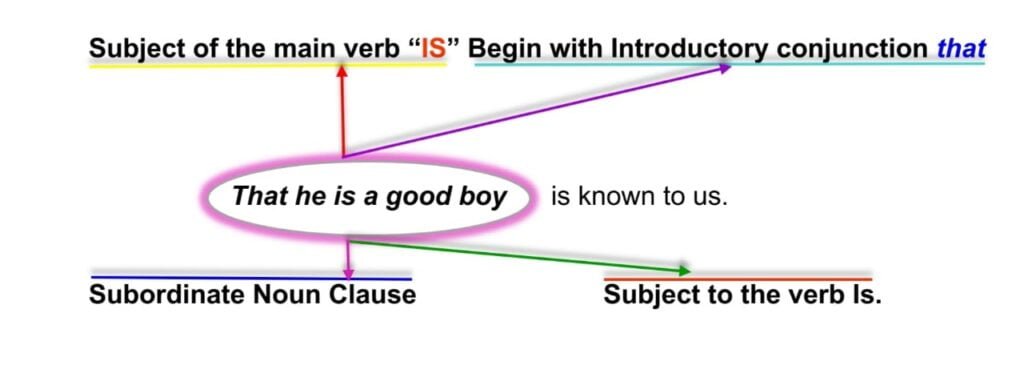
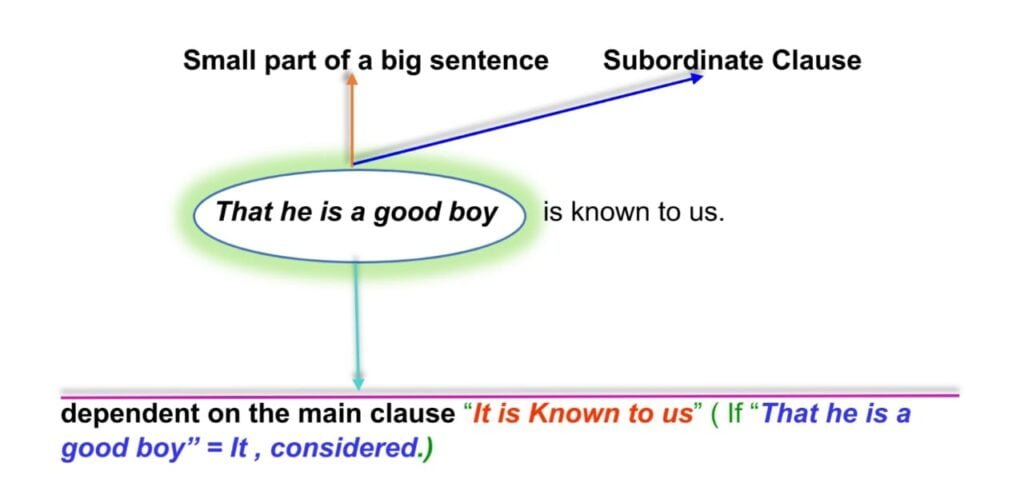
Identify Noun Clauses with Examples of Subjects to a verb will become easy if proper analysis makes of the following single sentences. For Examples: For Example:
(i) Someone telephoned me. It is still a mystery.
Ans: Who telephoned me is still a mystery. ( linking word who Relative Pronoun)
(ii) He prefers something. It is not known to me.
Ans: Which he prefers is not known to me.
(iii) He is a good boy. It is known to us.
Ans: That he is a good boy is known to us.
(iv) He will come at any time. This is uncertain.
Ans: When he will come is uncertain.
(v) He is ill. It is known to all.
Ans: That he is ill is known to all.
The object of a sentence must be either a noun or a noun equivalent. When a clause becomes either an object of a sentence, this becomes a subordinate Noun Clause; an object to a verb.
Example: We know that the earth is a planet.
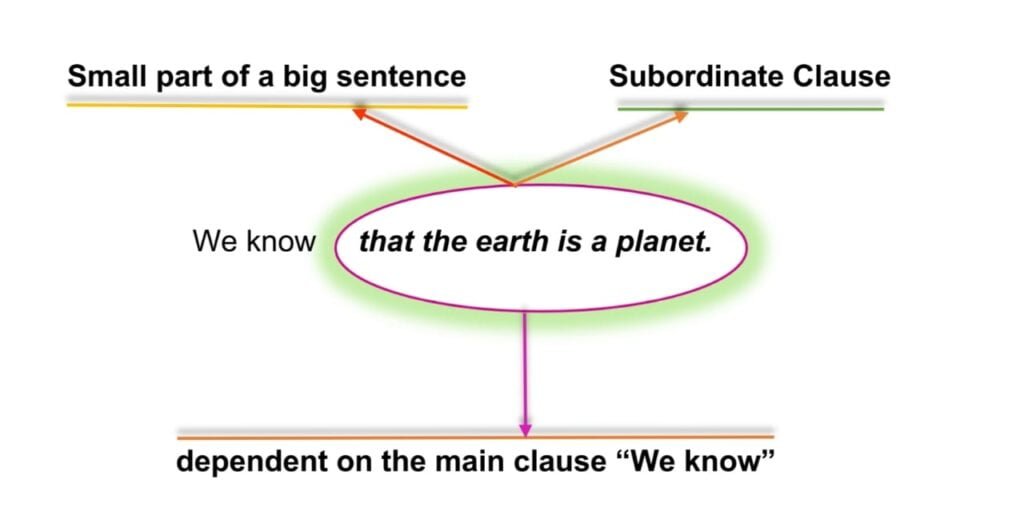
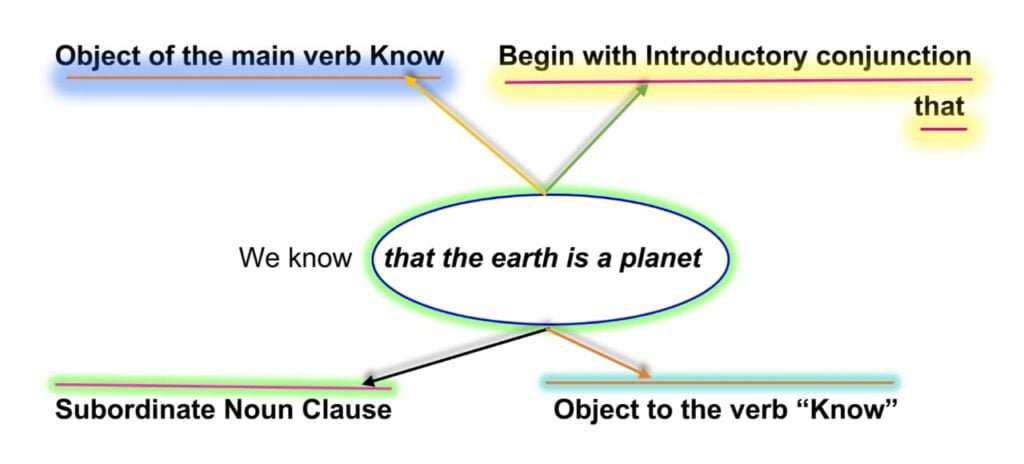
Identify Noun Clauses with Examples of Objects to a verb will become easy if proper analysis makes of the following single sentences . For Examples:
(i) Tell me frankly. Why did you do this?
Ans: Tell me frankly why you did this.
(ii) You want something. I ask you about it.
Ans: I ask you what you want.
(iii) I shall return. I do not know the time.
Ans: I do not know when I shall return.
(iv) He means something. I know that.
Ans: I know what he means.
(v) She had written the letter. She denied that.
Ans: She denied that she had written the letter.
A noun clause can be the object of prepositions in the same way as a noun or pronoun can be.
Example: He told everyone of what he had heard.
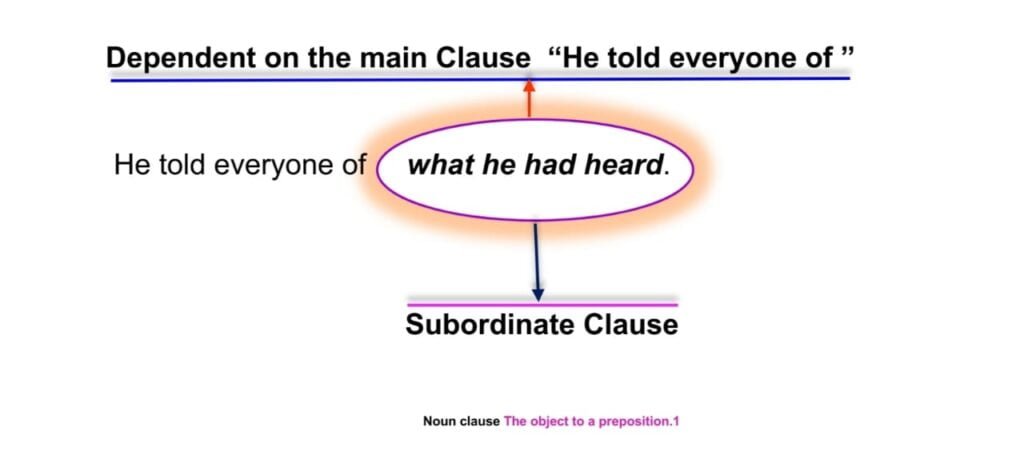
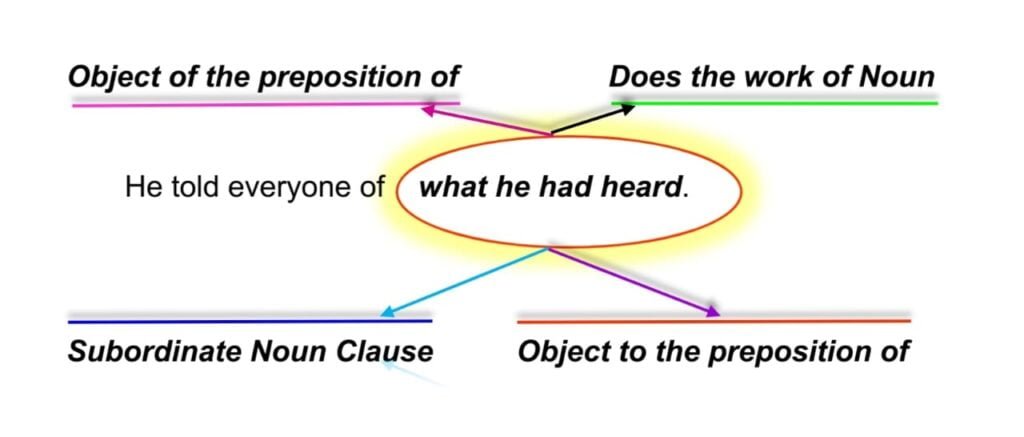
Identify Noun Clauses with Examples of Objects to a preposition will become easy if proper analysis makes of the following single sentences.
(i) I say something. Pay careful attention to it.
Ans: Pay careful attention to what I say.
(ii) He will do something. I know nothing of it.
Ans: I know nothing of what he will do.
(iii) You say something. There is no meaning in it.
Ans: There is no meaning in what you say.
(iv) You work hard. Your success depends on it.
Ans: Your success depends on how hard you work.
(v) He behaves well. He will be judged by it.
Ans: He will be judged by how he behaves.
Some Transitive Verbs take one object only but still require some word or words to make the predication complete. The Complement is the additional word or words that make the predication complete. The compliment may be in seven forms: a noun, an adjective, a participle, a preposition with its object, an Infinitive verb, an Adverb, or a Noun Clause.
This is the name of those intransitive verbs which do not make complete sense by themselves but require a compliment to supply what the verb left unsaid. The compliment to intransitive verbs may be in the same kinds of form as the compliment to transitive verbs.
Example: This is exactly what I expected.
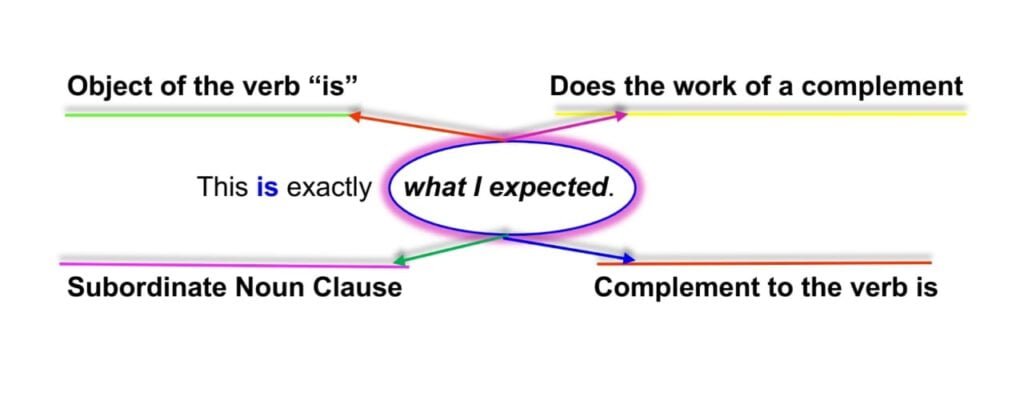
(i)The object of the “Be” verb will always be a compliment. (ii) If the complement of a Transitive verb or an Intransitive Verb is a clause, it must be a Subordinate Noun Clause or Nominal Clause.
Identify Noun Clauses with Examples of complement to a verb will become easy if proper analysis makes of the following single sentences.
(i) He will not come. This is my belief.
Ans: I believe that he will not come.
(ii) He may be allowed to resign. His request will be that.
Ans: He will request that he may be allowed to resign.
(iii) We tried to the last. Our satisfaction is that.
Ans: Our satisfaction is that we tried to the last.
(iv) There were no secret drawers on the desk. They made sure that.
Ans: They made sure that there were no secret drawers on the desk.
(v) All should help the helpless. His appeal was that.
Ans: His appeal was that all should help the helpless.
A noun is in apposition with another noun or with a pronoun when it refers to the same person or thing.
Example: Alexander, the king of Macedon, invaded India.
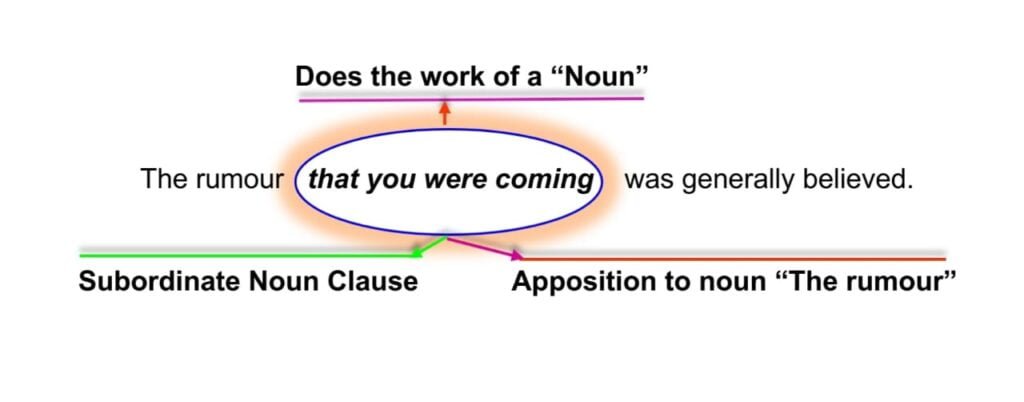
A sentence can be placed in apposition with a Noun or a Pronoun (It) to describe what is denoted by the Noun or the Pronoun (It).

Identify Noun Clauses with Examples in Appositon to a Noun or Pronoun will become easy if proper analysis makes of the following single sentences.
(I) The rumor that you were coming was generally believed.
(ii) It is true that he has come.
(iii) He has been arrested. There is a rumour.
Ans: There is a rumour that he has been arrested.
(iv) He is no more. The fact is painful to us.
Ans: The fact that he is no more is painful to us.
(v) You were absent. It was unfortunate.
Ans: It was unfortunate that you were absent.
(vi) The boy is honest. It is true.
Ans: It is true that the boy is honest.
(vii) His belief cheered me. Someday he would succeed.
Ans: His belief that someday he would succeed cheered me.
There are three kinds of connectives or linkers that may introduce a Noun Clause.
Example: He told us (the fact) that rain had fallen.
[The dependent sentence in the above example is in apposition with the noun in the bracket; sometimes it may be either omitted or expressed.]
Example: I know that he is ill.
[when no noun stands before “that” for apposition, it might be called the Introductory Conjunction.]
Why he was crying is unknown to his father. (Relative Adverb)
I want to know whether or if he will play with us. (Interrogative Adverb)
Who knew the fact was not present here? (Relative Pronoun)
I want to know who will be with you tomorrow. ( Interrogative Pronoun)
When we are going to form Noun Clause joining two or more sentences, generally the linker , “ that ” is used in most of the cases, but sometimes “ who ” , “ whose ” , “ what ” , “ which ” , “ how ” are also used as linkers to form Noun Clause in case of “ subject ” , “ object ” , “ complement ” or “apposition”.
(1) I know that you are right.
(2) I heard what he had said. When he will go is not known.
(3) It is clear that he did it.
(4) I know where he lives and what he does.
(5) There is a rumour that he will return soon.
(6) Why he said so is a mystery.
(7) Can you say when he will come?
(8) That he is intelligent is admitted by all.
(9) It is said that he will resign.
(10) I know nothing about what he will do.
(11) The girl asked if I had seen her father.
(13) I asked him if he knew when the examination would commence.
(14) It is known that he is a rogue.
(15) I know what his intention is.
(16) We believe what he says.
(17) He wants that I should
(18)That he is honest is known to all.
(19)I know where he was born.
(20)It seemed impossible that he could escape.
(21)Tell me where he lives.
(22) I admit that he is a great poet.
(23) His request will be that he may be allowed to resign.
(24) Our satisfaction is that we tried to the last.
(25) They made sure that there were no secret drawers in the desk.
(1) Someone telephoned me. It is still a mystery.
(2) He prefers something. It is not known to me.
(3) He is a good boy. It is known to us.
(4) He will come at any time. This is uncertain.
(5) He is ill. It is known to all.
(6) Tell me frankly. Why you did this.
(7) You want something. I ask you about it.
(8) I shall return. I do not know the time.
(9) He means something. I know that.
(11) I say something. Pay careful attention to it.
(12) He will do something. I know nothing of it.
(13) You say something. There is no meaning in it.
(14) You work hard. Your success depends on it.
(15) He behaves well. He will be judged by it.
(16) He will not come. This is my belief.
(17) He may be allowed to resign. His request will be that.
(18) We tried to the last. Our satisfaction is that.
(19) There were no secret drawers in the desk. They made sure that.
(20) All should help the helpless. His appeal was that.
(21) He has been arrested. There is a rumour.
(22) He is no more. The fact is painful to us.
(23) You were absent. It was unfortunate.
(24) The boy is honest. It is true.
(25) His belief cheered me. Someday he would succeed.
A: No, a noun clause is dependent and cannot function as a standalone sentence.
A: Common introducers include “that,” “whether,” “who,” “whom,” “what,” “when,” “where,” “why,” etc.
A: No, noun clauses function as nouns, while relative clauses act as adjectives to modify nouns.
A: Certainly! Another example is “His hope, that they would reconcile, remained unfulfilled.”
A: Noun clauses replace or stand in for direct objects, while direct objects receive the action of the verb.
A: Certainly! Another example is “His hope, that they would reconcile, remained unfulfilled.”